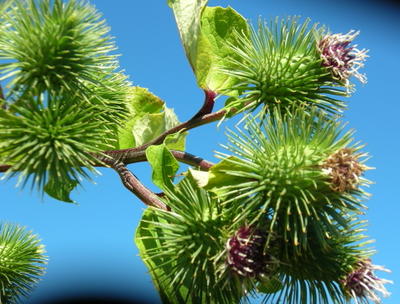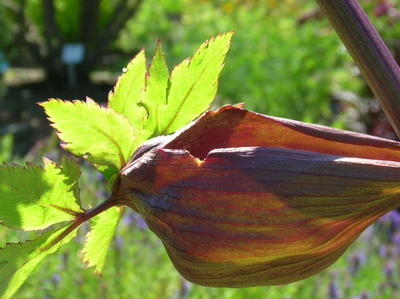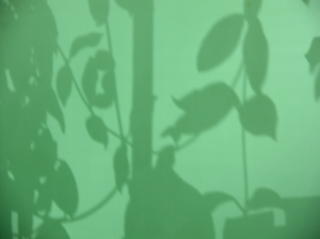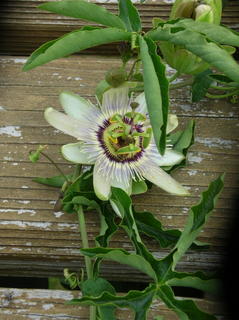

Some of denizens of the medicinal herb garden at Bastyr University (top is Arctium lappa/Burdock and bottom is Angelica archangelica)
Chris W replied to my email this morning, saying,
"i have cooking metaphors coming to me. i think i'll write a poem:
isn't every cook
a culture of her own,
how she knows mushrooms,
how she knows salt,
the lifelong gathering
of living ingredients, each one
its own astounding self, each one
a culture of its own, yet
in her hands
an ingredient
(ingredient is not a beautiful word
until i decide to make it so
by imagining a sprig of seven basil leaves
in your hands)
the other day i met someone
who cooked with many of my ingredients
in a completely different way
because her living had taught her stories
about what comes before and what comes after
the time of cooking, stories
i had not lived or seen or been taught before
and i let myself be a dry sponge
in the curious clear waters of her ways
and, delight of delights,
she experienced me the same way:
(wow, yes, look what you do, look how:
a way that no one ever taught you, your own
accumulation of ways, so precise to yourself)
so we're bartering mentoring time
hanging out in one another's kitchens
not a moment too soon, as we are called
to do our thing at the big ceremonial feast
whose wild glow is visible in the night sky
over the next small ridge"
"Dig anywhere deeply enough and it will take you Home"~My friends Joel Levey, PhD and Michelle Levey, MA, during their presentation to our "CAM camp" students on Meditation and Healing, about the infinite variety of spiritual paths.
 Homeopathic medicines are infinitesimal and potentized dilutions made from just about any substance medicine-makers can get their hands on (including plant, mineral, animal, microbial materials) and some that they can't (moonlight, X-ray radiation). Just as with any medicine, there are commonalities amongst remedies that are derived from related substances. Categories such as the Plant, Mineral and Animal Kingdom remedies have some broadly distinguishing traits and patterns--and theory is that the patterns and themes of a particular substance are reflected in the physical symptoms, personality characteristics, the world-view, even the dreams, of a person who would benefit from the medicine made from that substance. I don't know what my homeopath friends would prescribe for me these days--in the past I've benefitted from two remedies that derive from sea creatures...but one is categorized as a mineral, because it's the shell that's potentized, and the other is categorized as an animal remedy. You can read some interesting notes about remedies made from sea animals here.
Bombay master homeopath and physician Rajan Sankaran has said that in this time of great extinction, the essence of the animals and plants that are disappearing is showing up more and more in human beings.
Homeopathic medicines are infinitesimal and potentized dilutions made from just about any substance medicine-makers can get their hands on (including plant, mineral, animal, microbial materials) and some that they can't (moonlight, X-ray radiation). Just as with any medicine, there are commonalities amongst remedies that are derived from related substances. Categories such as the Plant, Mineral and Animal Kingdom remedies have some broadly distinguishing traits and patterns--and theory is that the patterns and themes of a particular substance are reflected in the physical symptoms, personality characteristics, the world-view, even the dreams, of a person who would benefit from the medicine made from that substance. I don't know what my homeopath friends would prescribe for me these days--in the past I've benefitted from two remedies that derive from sea creatures...but one is categorized as a mineral, because it's the shell that's potentized, and the other is categorized as an animal remedy. You can read some interesting notes about remedies made from sea animals here.
Bombay master homeopath and physician Rajan Sankaran has said that in this time of great extinction, the essence of the animals and plants that are disappearing is showing up more and more in human beings.
Another expression of the way humans and the "more-than-human" world reflect one another: one of the enchanting aspects of the world created by Philip Pullman in his series of books, called His Dark Materials, is that every human being there is born with a "daemon", an aspect of their soul who appears in animal form, inseparable from the person, their visible essence. (Another enchanting aspect is the two male angels who adore each other and have been together for eons.) The daemon plays with changing from animal to animal all through childhood, and then at puberty settles into the right stable form. Pullman says (in the interview linked to above) that a person can't choose what their daemon is; and for us here, who can't (usually!) see our own, we have to ask others who know us to tell us what ours is.
And then, there is our own internal resonance. A homeopath might match me to one aspect of this world, and in Pullman's world I might cleave to another aspect; in my own imagination, I feel most at home in the kingdom of the plants. And I'm pretty sure that if I were a plant, I would be a vine. One of those vines that climbs up things with curly tendrils towards the sun, and sprawls into all of the available space and slides between and into other plants, and flings out new growth when it's whacked back to the roots. Oh, and has flowers that attract hummingbirds!
The vines I have in my small yard: red honeysuckle, clematis (5 kinds), wisteria, two kiwis (a fuzzy male and smooth female), passionflower, jasmine, cardinal creeper (and usually I have annual morning glories and cup-and-saucers and sweet peas, but I didn't get around to planting them this year), and unfortunately there is also perennial morning glory (otherwise known as bindweed). And in the house I have two hoya carnosas (the photo at the top is the silhouette of one of my hoyas, when it was in my office).
Here is my friend and relation, the passionflower (Passiflora caerulea) out on the deck behind our house:

Andy sent me this fun thing to do, a consideration of books in my life. Because the set of questions is being sent on from blog-person to blog-person, it's kind of like a chain letter, or a contagious virus; or like a game of tag. (I guess "technically" it's called a "meme" which is "an idea or behavior that spreads through a culture" and which seems to be related to "mimic" and to the French word for "same" which is "meme" with a little accent over the first "e" which I don't know how to type in Blogger-text.)I think it is also an opportunity for rediscovery and praise, as well as a very good way to avoid tackling the piles of work spread all over the dining room table (I've even managed to accumulate a pile of stuff to do under my laptop).How many books I've ownedI would be surprised if anyone I know who is over the age of 6 knows how many books they own. Just lots, and lots. Lots. Even after selling big boxfuls and giving piles away. I do love and appreciate the Public Library system, but I can't write in those books. Once I have a relationship with the ideas or fall in love with any of the phrases or passages, I want to have my own copy so that I can write back, in the margins.Reading styleDuring spare moments, and at night. My husband and sons and I take our books with us when we go to restaurants, and if we're not talking, then we're reading. I always have a magazine or journal or article to read in my briefcase, and always take a book (sometimes just a blank book) when I'm carrying a backpack or purse. I also often read in the hottub. So, my books not only have handwriting and drawing in them, they often have water spots too (I don't do those things to books I borrowed, though, honest!)The last book I boughtMediated: How the Media Shapes Your World and the Way You Live In It by Thomas de Zengotita, on the recommendation of Toyce at the Integral Education Center. I haven't started it yet--it's in the "next" pile.The last book I readHmm. I guess that means the last book I actually finished. There are many many books on the floor or on my desk or in one of my bags that I have read part of and then put down, either for a while, or for pretty much ever.So, the last book that I read all the way through (and didn't even skip the boring parts because there weren't any) is called Field Notes on the Compassionate Life: A Search for the Soul of Kindness, by Marc Ian Barasch. He explores the nature of human (and animal) compassion and altruism from the perspectives of neuroscience, spiritual teachings and practice, psychology, evolutionary theory, and through interviews with people who have forgiven unthinkably horrible crimes, and with people who have gone way out of their way for total strangers, wondering: what is the essence of compassion? Can it be learned? Is kindness counter-evolutionary, or the ultimate evolutionary force?It's written in a personal style that in itself is elevating. Here's a bit:"Something within us already conduces toward heartfulness, and its nature is to grow with the merest effort. Aldous Huxley, asked on his deathbed to sum up what he had learned in his eventful life, said, "It's embarrassing to tell you this, but it seems to come down mostly to just learning to be kinder." And though I set out to write a more hardheaded, less softhearted (and perhaps les softheaded) book, I can onloy conclude the same.
People living in arid countries have found a simple method of collecting water. They spread out sheets of fabric at night and siphon off the dew that condenses on them each morning. Like moisture, love really is in the air. It will settle upon the thinnest reed, scintillate on a bare tip of grass, free for the taking. It is an elixir that can heal, drop by drop, all the sorrow and separation in the world. It changes pretty much everything."
Five books that mean a lot to mePilgrim at Tinker Creek, by Annie DillardComing to Life: Traveling the Spiritual Path in Everyday Life, by Polly Berrien BerendsThe Spell of the Sensuous: Perception and Language in a More-Than-Human World, by David AbramThe Jew in the Lotus: A Poet's Rediscovery of Jewish Identity in Buddhist India, by Rodger KamenetzHis Dark Materials (a trilogy that includes The Golden Compass, The Subtle Knife, and The Amber Spyglass), by Philip PullmanI love the language and the ideas and the perspectives of all of these books so much, and don't think I can describe then well enough to even try.(And these are the books I'm reading now--a new category that wasn't in the original recipe...)Principles and Practice of Phytotherapy: Modern Herbal Medicine by Kerry Bone and Simon MillsThe World Cafe: Shaping Our Future Through Conversations that Matter, by Juanita Brown with David IsaacsJerusalem: One City, Three Faiths, by Karen ArmstrongConsciousness & Healing: Integral Approaches to Mind-Body Medicine, edited by Marilyn Schlitz and Tina Amorok with Marc S. MicozziInvite some more to playI'll see if Open Space friends Ashley, Chris, Jeff and Michael, and new-to-blogging, long-time-friend, Brad, are interested--particularly, of course, I'd like to know what their "books that mean a lot to me" are, so that I can read them,too.


 Homeopathic medicines are infinitesimal and potentized dilutions made from just about any substance medicine-makers can get their hands on (including plant, mineral, animal, microbial materials) and some that they can't (moonlight, X-ray radiation). Just as with any medicine, there are commonalities amongst remedies that are derived from related substances. Categories such as the Plant, Mineral and Animal Kingdom remedies have some broadly distinguishing traits and patterns--and theory is that the patterns and themes of a particular substance are reflected in the physical symptoms, personality characteristics, the world-view, even the dreams, of a person who would benefit from the medicine made from that substance. I don't know what my homeopath friends would prescribe for me these days--in the past I've benefitted from two remedies that derive from sea creatures...but one is categorized as a mineral, because it's the shell that's potentized, and the other is categorized as an animal remedy. You can read some interesting notes about remedies made from sea animals here.
Homeopathic medicines are infinitesimal and potentized dilutions made from just about any substance medicine-makers can get their hands on (including plant, mineral, animal, microbial materials) and some that they can't (moonlight, X-ray radiation). Just as with any medicine, there are commonalities amongst remedies that are derived from related substances. Categories such as the Plant, Mineral and Animal Kingdom remedies have some broadly distinguishing traits and patterns--and theory is that the patterns and themes of a particular substance are reflected in the physical symptoms, personality characteristics, the world-view, even the dreams, of a person who would benefit from the medicine made from that substance. I don't know what my homeopath friends would prescribe for me these days--in the past I've benefitted from two remedies that derive from sea creatures...but one is categorized as a mineral, because it's the shell that's potentized, and the other is categorized as an animal remedy. You can read some interesting notes about remedies made from sea animals here.